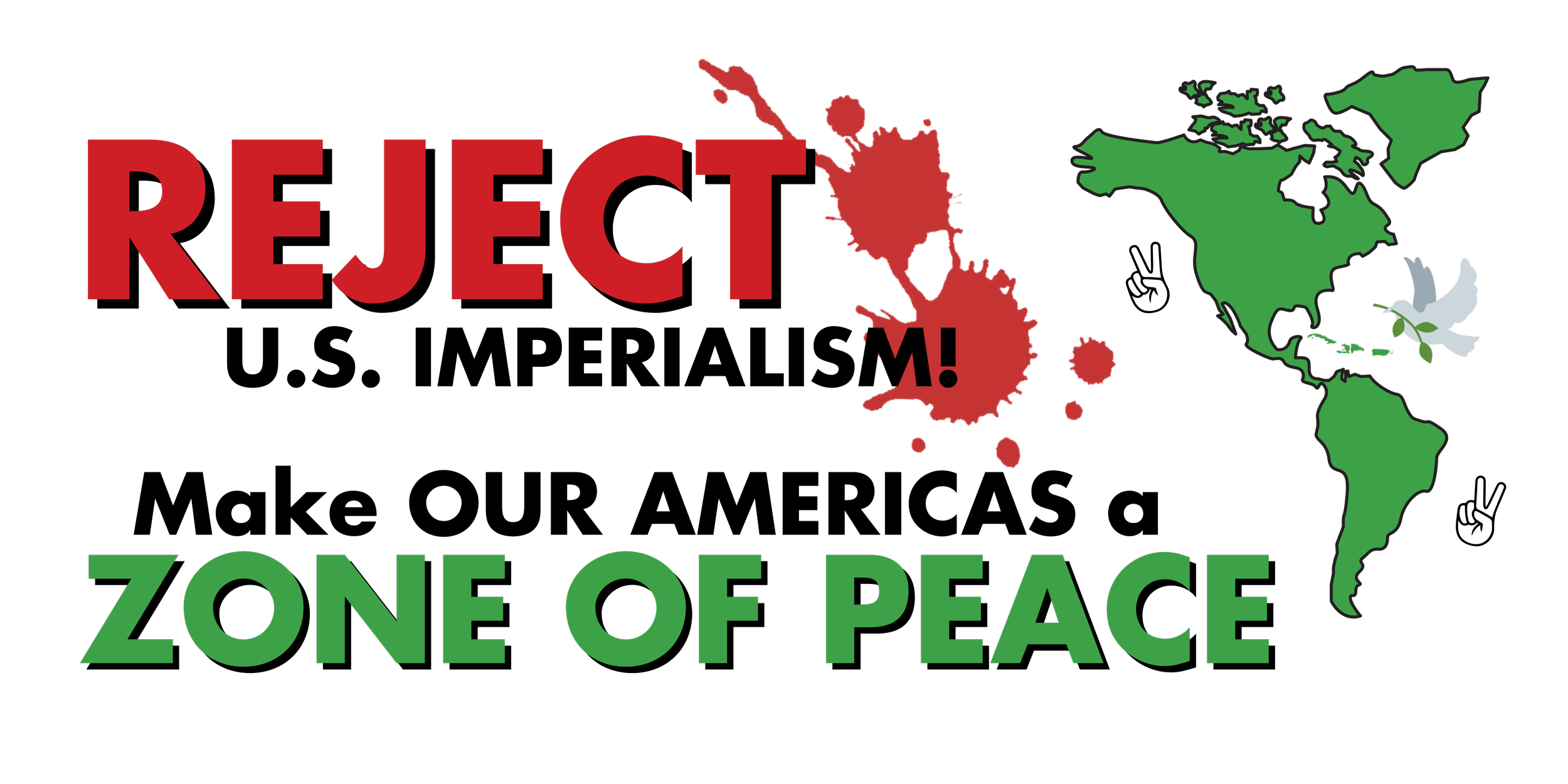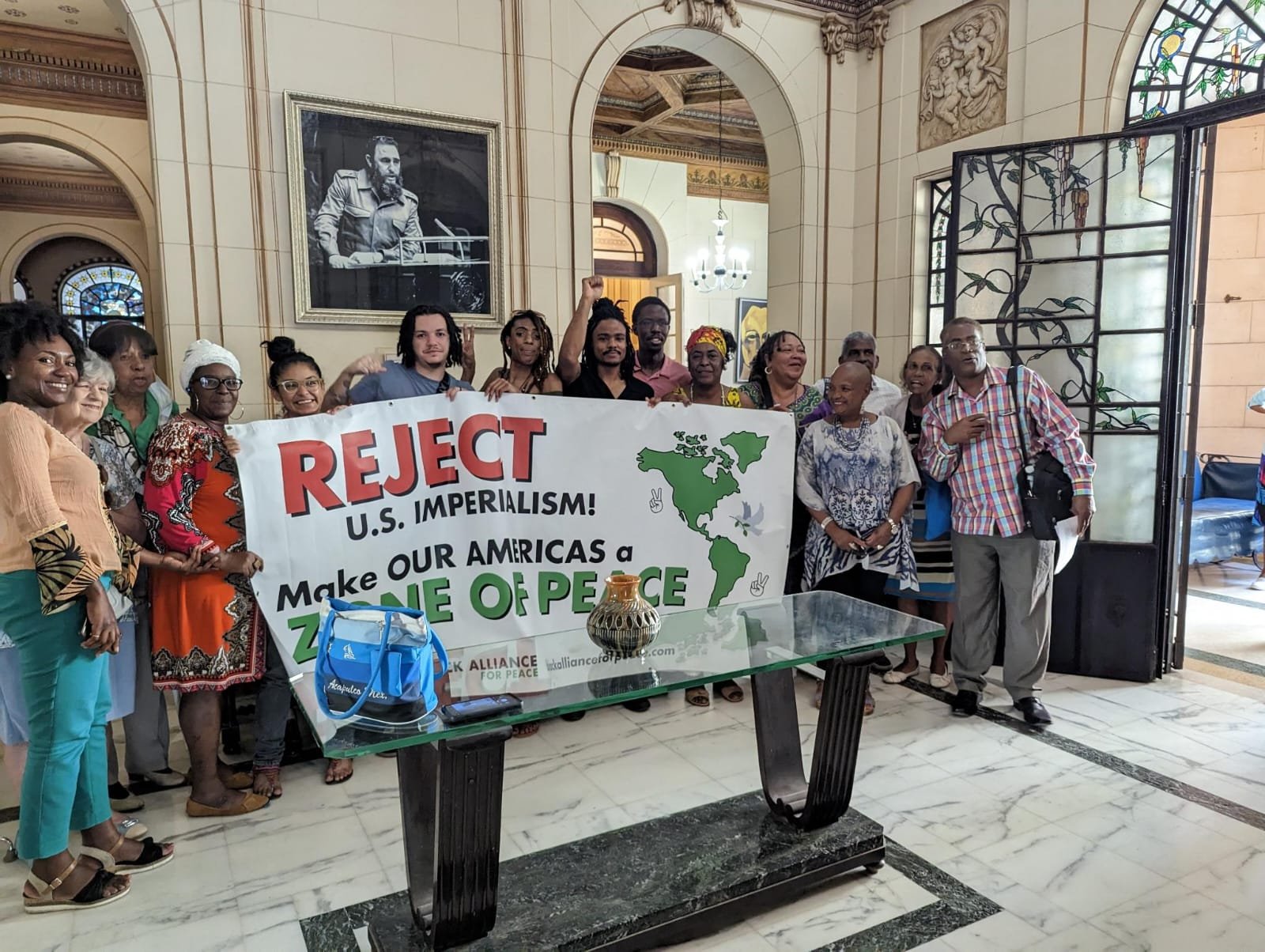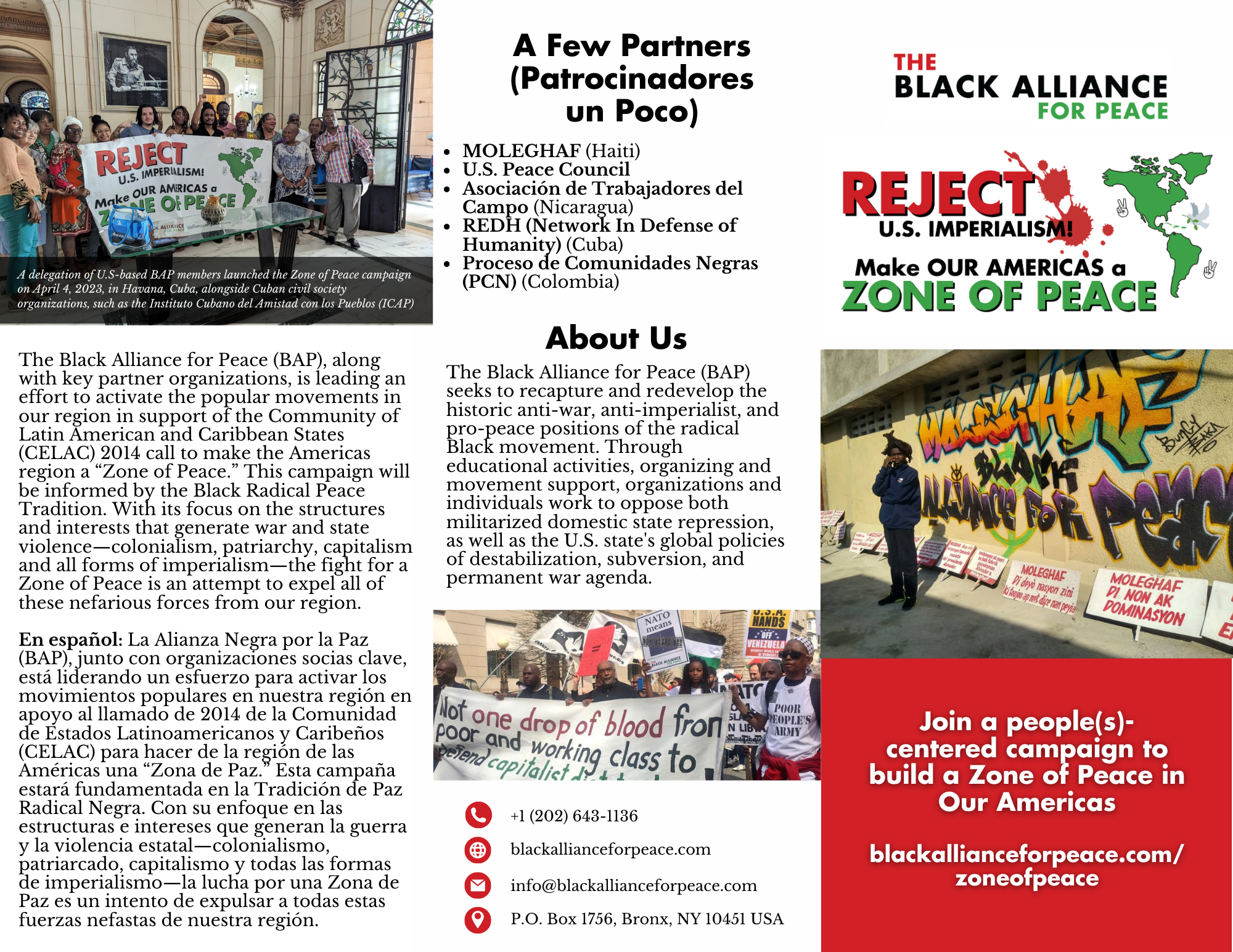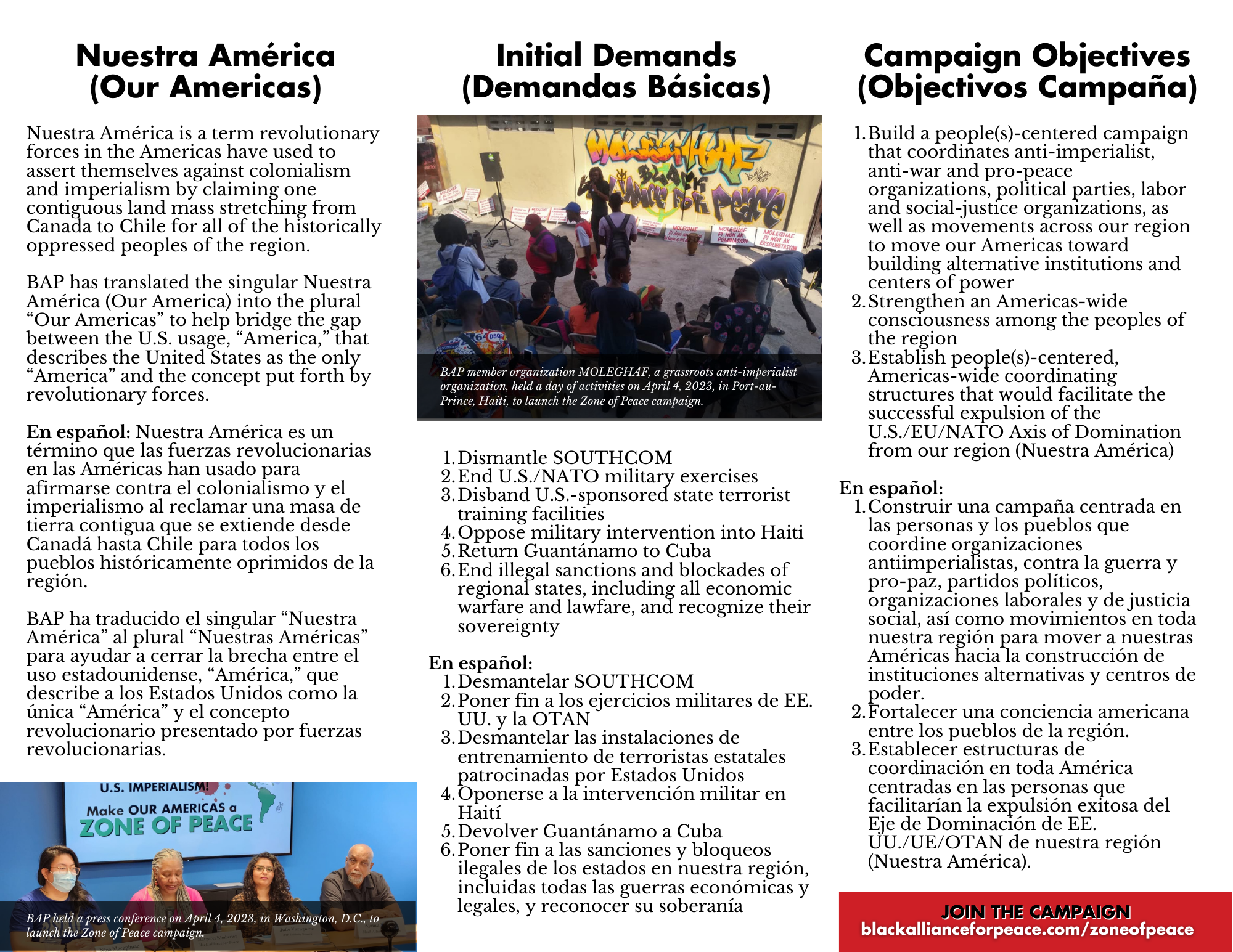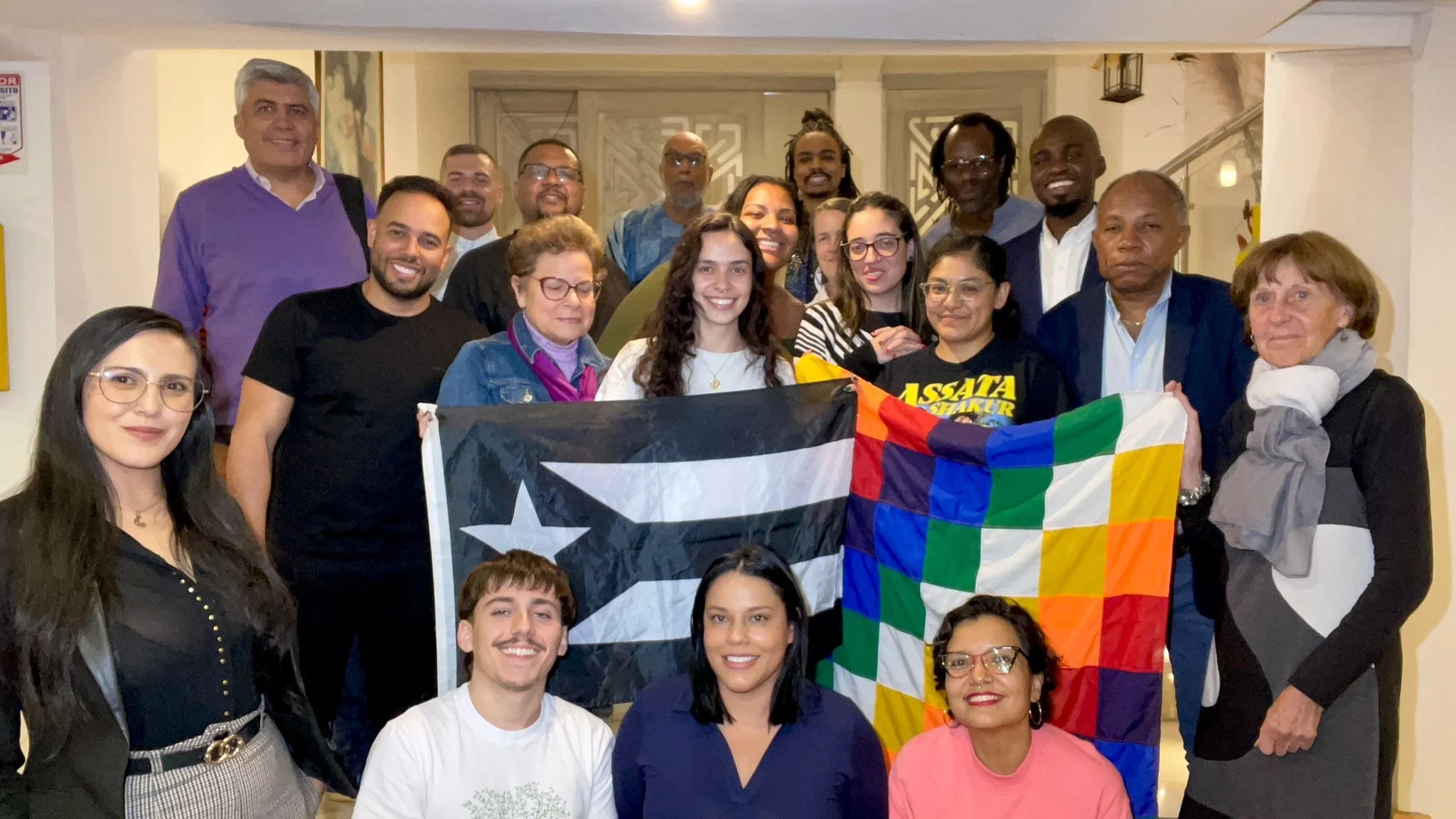Zone of Peace Campaign / Campaña Zona de Paz / KANPAY ZÒN LAPÈ
The Black Alliance for Peace (BAP), along with key partner organizations, is leading an effort to activate the popular movements in our region in support of the Community of Latin American and Caribbean States (CELAC) 2014 call to make the Americas region a “Zone of Peace.” This campaign will be informed by the Black Radical Peace Tradition. With its focus on the structures and interests that generate war and state violence—colonialism, patriarchy, capitalism and all forms of imperialism—the fight for a Zone of Peace is an attempt to expel all of these nefarious forces from our region.
En español: La Alianza Negra por la Paz (BAP), junto con organizaciones socias clave, está liderando un esfuerzo para activar los movimientos populares en nuestra región en apoyo al llamado de 2014 de la Comunidad de Estados Latinoamericanos y Caribeños (CELAC) para hacer de la región de las Américas una “Zona de Paz.” Esta campaña estará fundamentada en la Tradición de Paz Radical Negra. Con su enfoque en las estructuras e intereses que generan la guerra y la violencia estatal—colonialismo, patriarcado, capitalismo y todas las formas de imperialismo—la lucha por una Zona de Paz es un intento de expulsar a todas estas fuerzas nefastas de nuestra región.
Haitian Kreyol: Aliyans Nwa pou Lapè (BAP), ansanm ak òganizasyon patenaryat kle, ap mennen yon efò pou aktivize mouvman popilè yo nan zòn nou an, nan sipò Kominote peyi Amerik Latin ak Karayib yo (CELAC) epi yo reponn a apèl 2014 lan pou fè rejyon Amerik yo tounen yon "Zòn Lapè". Kanpay sa a pral baze sou Tradisyon Lapè Radikal Nwa. Avèk konsantre sou struktir ak enterè ki kreye lagè ak vyolans leta—kolonyalism, patryach, kapitalis ak tout fòm entènasyonalis—lit pou yon Zòn Lapè se yon tansyon pou sòti tout fòs malveyan sa yo nan rejyon nou an.
Nuestra América (Our Americas) / AMERIK NOU YO
Nuestra América is a term revolutionary forces in the Americas have used to assert themselves against colonialism and imperialism by claiming one contiguous land mass stretching from Canada to Chile for all of the historically oppressed peoples of the region.
BAP has translated the singular Nuestra América (Our America) into the plural “Our Americas” to help bridge the gap between the U.S. usage, “America,” that describes the United States as the only “America” and the concept put forth by revolutionary forces.
En español: Nuestra América es un término que las fuerzas revolucionarias en las Américas han usado para afirmarse contra el colonialismo y el imperialismo al reclamar una masa de tierra contigua que se extiende desde Canadá hasta Chile para todos los pueblos históricamente oprimidos de la región.
BAP ha traducido el singular “Nuestra América” al plural “Nuestras Américas”; para ayudar a cerrar la brecha entre el uso estadounidense, “América,” que describe a los Estados Unidos como la única “América” y el concepto revolucionario presentado por fuerzas revolucionarias.
Haitian Kreyol: Se yon tèm fòs revolisyonè nan Amerik yo te itilize pou reafime tèt yo kont kolonyalism ak entènasyonalis, nan menm tan revandike yon tè ameriken ki kontinye soti nan Kanada jiska Chili pou tout pèp ki te sibi opresyon nan rejyon an.
BAP te tradui ekspreyon singular Nuestra América (Nout Amerik nou yo) nan plural "Nout Amerik yo" pou ede rasanble distans ant itilizasyon nan peyi Etazini, “Amerik,” ki dekri Etazini kòm sèl “Amerik” ak konsèp la pwopoze pa fòs revolisyonè yo.
Initial Core Demands / DemandAs Básicas iniciales / Deman Kò
Dismantle SOUTHCOM. Shut down the 76 U.S. military bases in the region
End U.S./NATO military exercises. Close foreign military bases, installations and enclaves, as well as withdraw foreign occupation troops
Disband U.S.-sponsored state terrorist training facilities. Shutter the “Western Hemisphere Institute for Security Cooperation” (WHINSEC)—formerly the School of the Americas—in Fort Benning, Georgia, United States, and terminate U.S.—as well as foreign—training of police forces
Oppose military intervention into Haiti. Support the people(s)-centered movement for democracy and self-determination
Return Guantánamo to Cuba. The United States must give back to the Cuban people and their government the territory it illegally occupies
Sanctions are war. End illegal sanctions and blockades of regional states, including all economic warfare and lawfare, and recognize their sovereignty
En español:
Desmantelar SOUTHCOM. Cerrar las 76 bases militares estadounidenses en la región.
Poner fin a los ejercicios militares de EE. UU. y la OTAN. Cerrar bases, instalaciones y enclaves militares extranjeros, así como retirar las tropas de ocupación extranjeras.
Desmantelar las instalaciones de entrenamiento de terroristas estatales patrocinadas por Estados Unidos. Cerrar el “Instituto del Hemisferio Occidental para la Cooperación en Seguridad” (WHINSEC), anteriormente la Escuela de las Américas, en Fort Benning, Georgia, Estados Unidos, y poner fin al entrenamiento de las fuerzas policiales en los EE. UU. y en el extranjero.
Oponerse a la intervención militar en Haití. Apoyar el movimiento centrado en las personas por la democracia y la autodeterminación.
Devolver Guantánamo a Cuba. Estados Unidos debe devolver al pueblo cubano y a su gobiernoel territorio que ocupa ilegalmente.
Las sanciones son la guerra. Poner fin a las sanciones y bloqueos ilegales de los estados en nuestra región, incluidas todas las guerras económicas y legales, y reconocer su soberanía.
Haitian Kreyol:
Demantèl SOUTHCOM. Fèmen 76 baz militè ameriken yo nan rejyon an.
Sispann egzèsis militè ant peyi Etazini ak NATO. Fèmen baz militè etranje, enstalasyon ak anvayi militè etranje, ak retire toup militè okipasyon etranje yo.
Dismete enstitisyon fòme teworis eta ameriken an. Fèmen “Western Hemisphere Institute for Security Cooperation” (WHINSEC) - ki te anvan te rele Lekòl Amerik di Sid—nan Fort Benning, Jòjji, Etazini, epi sispann fòmasyon eta ameriken ak etranje nan fòs polis yo.
Opoze enplike militè nan Ayiti. Sipòte mouvman ki santre sou moun yo pou demokrasi ak autodetèminasyon.
Remèt Guantánamo bay Kiba. Etazini dwe remèt tèritwa a bay pèp Kiben ak gouvènman li a pou teritwa sa a li okipe ilegalman.
Sanksyon se lagè. Sispann sanksyon ilegal ak blokis rejyon yo, ki gen ladan tout lagè ekonomik ak lagè dwa, epi rekòmande swadizan yo.
CAMPAIGN OBJECTIVES / Objetivos de la campaña / OBJEKTIF KANPAY
Build a people(s)-centered campaign that coordinates anti-imperialist, anti-war and pro-peace organizations, political parties, labor and social-justice organizations, as well as movements across our region to move our Americas toward building alternative institutions and centers of power
Strengthen an Americas-wide consciousness among the peoples of the region
Establish people(s)-centered, Americas-wide coordinating structures that would facilitate the successful expulsion of the U.S./EU/NATO Axis of Domination from our region (Nuestra América)
En español:
Construir una campaña centrada en las personas y los pueblos que coordine organizaciones antiimperialistas, contra la guerra y pro-paz, partidos políticos, organizaciones laborales y de justicia social, así como movimientos en toda nuestra región para mover a nuestras Américas hacia la construcción de instituciones alternativas y centros de poder.
Fortalecer una conciencia americana entre los pueblos de la región.
Establecer estructuras de coordinación en toda América centradas en las personas que facilitarían la expulsión exitosa del Eje de Dominación de EE. UU./UE/OTAN de nuestra región (Nuestra América).
Haitian Kreyol:
Kreye yon kanpay ki santre sou moun yo, ki koòdone òganizasyon anti-entènasyonalis, anti-lagè, ak pwogrè, pati politik, òganizasyon travay ak jistis sosyal, ansanm ak mouvman atravè rejyon nou an, pou fè Amerik nou yo avanse nan direksyon bati enstitisyon alterna ak sant pouvwa.
Reyafèmen yon konsyans atravè Amerik la nan mitan pèp yo nan rejyon an.
Etabli yon struktir koòdone ki santre sou moun yo, atravè Amerik la, ki ta pèmèt eksplusyon siksè aksis Dominasyon Etazini/Ewopeyen/NATO nan rejyon nou an.
METHODOLOGY / METODOLOGÍA / METODOLOJI
This work must be de-colonial, anti-imperialist, advance a People(s)-Centered Human Rights (PCHRs) framework, and be conducted across at least five languages: English, Spanish, Portuguese, French and Haitian Creole.
En español: Este trabajo debe ser decolonial, antiimperialista, promover un marco de derechos humanos centrado en las personas (CPDH) y realizarse en al menos cinco idiomas: inglés, español, portugués, francés y criollo haitiano.
Haitian Kreyol: Travay sa a dwe dekolonize, anti-entènasyonalis, avanse sou kad. Dwa Moun ki santre sou Moun (Dwa Moun Konsantre sou Moun) ak dwe fèt atravè omwen senk lang: Angle, Panyòl, Pòtigè, Franse ak Kreyòl Ayisyen.
Building a People(s)-Centered Zone of Peace in our americas / Construyendo una Zona de Paz Centrada en las Personas en Nuestras Américas / KONSTWI YON ZÒN LAPÈ SANTRE SOU MOUN NAN AMERIK NOU YO
Endorsers / Patrocinadores
Mouvement National pour la Liberté et L’égalité des Haïtiens pour la Fraternité (MOLEGHAF, or National Movement for Liberty and Equality of Haitians for Fraternity) (Haiti)
Red en Defensa de la Humanidad (REDH, or Network In Defense of Humanity) (Cuba)
Task Force on the Americas (United States)
Coordinación Nacional de Comunidades y Organizaciones Afrodescendientes (CONAFRO) (Colombia)
Friends of Latin America (United States)
Caribbean Organisation for People's Empowerment
African People's Socialist Party (international)
Louisiana United International, Inc. (United States)
Proceso de Comunidades Negras (PCN) (Colombia)
Asociación de Trabajadores del Campo (Nicaragua)
All-African People's Revolutionary Party (international)
Reparations United (United States)
New York Boricua Resistance
AfroResistance (Colombia and United States)
Committee of Anti-Imperialists in Solidarity with Iran (CASI) (United States)
Malcolm X Center for Self Determination (United States)
Palestinian Youth Movement - Bay Area Chapter (United States)
Docente UNAM (México)
Mopassol (Argentina)
School of the Americas Watch (United States)
Racine Coalition for Peace and Justice (United States)
CODEPINK (United States)
Los Ronderos de las Redes (Perú)
Malcolm X Grassroots Movement (United States)
African National Women's Organization (United States)
U.S. Peace Council (United States)
Haiti Justice Committee of Minnesota (United States)
Grupo de Investigación Narrativa (Colombia)
Malcolm X Grassroots Movement (United States)
SOLI Puerto Rico
International Action Center (United States)
Popular Resistance (United States)
Observatorio de Derechos Humanos de los Pueblos (México)
International Manifesto Group (international)
Black is Back Coalition for Social Justice, Peace and Reparations (United States)
Orinoco Tribune (Venezuela)
Alliance for Global Justice (regional)
United National Antiwar Coalition (UNAC) (United States)
Geopolitical Economy Report / Geopolítica Económica (Nicaragua and United States)
COMUNISTES DE CATALUNYA, Universidad del Valle (España)
Anti-imperialism America (United States)
Casa Baltimore Limay
Nicaragua Network (Nicaragua and United States)
Diaspora Pa'lante Collective (Puerto Rico and United States)
Nicaragua Solidarity Coalition (United States)
Critical Perspectives on Democracy and Media at UCB (demoxmedia.org) (United States)
Canadian Peace Congress
G-REBLS (United States)
Women Against Military Madness (United States)
ENDORSE / APOYO
Join the call to build a Zone of Peace in Our Americas!
We invite organizations and individuals to endorse the Zone of Peace campaign and activate the popular movement element in this multi-phase campaign that aims to build a united-front opposition to liberate our Americas from the U.S./EU/NATO Axis of Domination.
En español:
¡Únete al llamado a construir una Zona de Paz en Nuestras Américas!
Invitamos a organizaciones e individuos a respaldar la campaña Zona de Paz y activar el elemento de movimiento popular en esta campaña de múltiples fases que tiene como objetivo construir una oposición de frente unido para liberar a nuestras Américas del Eje de Dominación de EE. UU./UE/OTAN.
Haitian Kreyol:
Vini reponn apèl la pou bati yon Zòn Lapè nan Amerik nou yo!
Nou envite òganizasyon ak moun endose kampany Zòn Lapè a ak aktive eleman mouvman popilè nan kampany sa ki gen plizyè faz ak objektif pou bati yon opozisyon fwont ki lye pou libere Amerik nou yo soti nan Dominasyon Aks Amerik la/EU/NATO.
Launch Events in Three Countries / LOS EvENTOS LANZADAS EN TRéS PAíses
Press conference held April 4 at the Institute for Policy Studies in Washington, D.C. Featuring BAP Coordinating Committee Chairperson Ajamu Baraka, Coordinating Committee member Margaret Kimberley, Haiti/Americas Team Co-Coordinator Jemima Pierre (remote) and BAYAN USA Secretary General Nina Macapinlac. Moderated by BAP Solidarity Network Co-Coordinator Julie Varughese.
En español: Conferencia de prensa celebrada el 4 de abril en el Instituto de Estudios de Políticas en Washington, D.C. con la participación del presidente del Comité de Coordinación de BAP, Ajamu Baraka, la miembro del Comité de Coordinación, Margaret Kimberley, la coordinadora del equipo de Haití/América, Jemima Pierre (remota), y la secretaria general de BAYAN USA, Nina Macapinlac. Moderado por la coordinadora de la Red de Solidaridad de BAP, Julie Varughese. Mira la reproducción de la transmisión en vivo.
BAP member organization MOLEGHAF, a grassroots anti-imperialist organization in Haiti, held a day of activities on April 4 in the capital of Port-au-Prince to launch the Zone of Peace campaign. The day featured a welcoming speech by MOLEGHAF member Ricardo Boucher to MOLEGHAF members and members of the public; a presentation on the Zone of Peace campaign by MOLEGHAF member Domini Resain; organizations providing testimonies on the need for an anti-imperialist, anti-militarist campaign in our Americas and Caribbean; an intervention featuring MOLEGHAF member Dieuseul Civil (better known as Ti Maksis); exchange and questions; dance, poetry and music by Adjamile, Mimetik and Jeff Ron; and a graffiti and signmaking session. The image above features MOLEGHAF and BAP’s names spraypainted on a wall. MOLEGHAF member Jean Ronald Montas led the committee tasked with organizing the day’s activities.
En español: MOLEGHAF, organización miembro de BAP, una organización antiimperialista de base en Haití, realizó un día de actividades el 4 de abril para lanzar la campaña Zona de Paz. El día contó con un discurso de bienvenida del miembro de MOLEGHAF, Ricardo Boucher, a los miembros de MOLEGHAF y al público; una presentación sobre la campaña Zona de Paz por parte de Domini Resain, miembro de MOLEGHAF; organizaciones que brindan testimonios sobre la necesidad de una campaña antiimperialista, antimilitarista en nuestra América y el Caribe; una intervención del miembro de MOLEGHAF Dieuseul Civil (más conocido como Ti Maksis); intercambio y preguntas; danza, poesía y música de Adjamile, Mimetik y Jeff Ron; y una sesión de graffiti y carteles. La imagen de arriba muestra los nombres de MOLEGHAF y BAP pintados con aerosol en una pared. Jean Ronald Montas, miembro de MOLEGHAF, dirigió el comité encargado de organizar las actividades del día.
BAP members with members of Cuban civil society at the Asociación Cubana de las Naciones Unidas (Cuban Association of the United Nations, ACNU) launching the Zone of Peace campaign on April 4, 2023, in Havana, Cuba.
En español: Miembros de la BAP con miembros de sociedad civil cubana en la Asociación Cubana de las Naciones Unidas (ACNU), lanzando la campaña Zona de Paz el 4 de abril 2023 en La Habana, Cuba.
PRESS RELEASE / comunicado de prensa
DOWNLOAD BROCHUREs / Descargar folletos
Can be printed on 8.5”x11” paper / Se puede imprimir en 8.5”x11” (215.9 mm x 279.4 mm) papel
Social Media Graphics in English / Gráficos de redes sociales en inglés
More graphics to come / Más gráficos por venir
LOGOS IN THREE LANGUAGES / LOS MARQUES EN TRéS Idiomas
RESOURCES In English / RECURSOS en inglés
Las Fichas Informativas en Español
BAP on SOUTHCOM in ENGLISH
SOUTHCOm’s role (In English) / El papel de SOUTHCOM en inglés
En español:
TWEET en inglés:
SOUTHCOM y todos los comandos militares de EE. UU. son extensiones de la OTAN.
Los ejercicios y operaciones conjuntas lideradas por SOUTHCOM deben entenderse como parte de la expansión de la OTAN en nuestra región. ��Erica Caines de @Blacks4Peace
pic.twitter.com/J2R2gu4Omk
— Kawsachun News (@KawsachunNews) 6 de junio de 2022
STATEMENTS and OPEN LETTERS / DECLARACIONES y CARTAS ABIERTAS (algunas en español)
ARTICLES IN ENGLISH / Artículos en ingles
The OAS, Or the “Ministry of Colonies” (April 27, 2022)
by Jemima Pierre
Black Agenda Report
“Haiti’s “sham elections,” as they were called, occurred in August and October of 2015, after massive public protests forced Martelly to organize legislative, local, and presidential elections. By this time Martelly was running the country by decree—a move that the OAS and Haiti’s other rulers supported—after allowing the terms of the Haitian senate to expire without elections. The result of Martelly’s actions were to leave Haiti without a functioning government. Despite extreme low voter turnout, electoral fraud, violence, and the destruction of ballots, the OAS, along with the UN (and the Core Group), immediately congratulated the country for its peaceful and “well-organized” elections. The OAS would later verify the election of Martelly’s handpicked successor, Jovenel Moïse as he proclaimed victory in a set of fraudulent elections in 2016.”
“Class Warfare and Socialist Resistance: Nicaragua, Cuba, Venezuela as Existential Threats to the U.S.” (November 10, 2021)
by Ajamu Baraka
Black Agenda Report
Why do Nicaragua, Cuba and Venezuela pose such an existential threat to the United States? The promise of socialism and their resistance to U.S. class warfare.
“The Limits of ‘Lived Experience’” (September 9, 2021)
by Erica Caines
Hood Communist
Anti-communist rhetoric from self-identifying socialists/communists is not new, but the relatively recent trend of rejecting revolutionary theory in favor of “lived experience” shows a lack in our processes for political education. The discourse following the protests that took place in Cuba on July 11, 2021, offers us a concrete example of this lack.
“Canadian Financial Imperialism and Structural Adjustment in the Caribbean” (2021)
by Tamanisha J. John
Class, Race and Corporate Power
From the start of the early 1980s, structural adjustment was already normalized in the Caribbean given the power of a variety of self-interested actors, including the U.S., IFIs, and Canadian investors who continued to advance and support—by any means necessary—structural adjustment policies in the Caribbean. Debt traps, coupled with incursions on Caribbean state’s sovereignty would see the neoliberal and capitalist doctrine accepted by all of the independent states in the English-speaking Caribbean region by the mid-1980s. Structural adjustment drastically intensified the existing inequalities in states and removed the ability for governments to alleviate these situations. Alongside Caribbean structural adjustment policies (SAPs) in the 1980s was also a successful wave of imperialist (anti-socialist and anti-communist) propaganda. The result being that many of the independent states in the region would see left governments replaced with reactionary conservative ones; And a small number of states confessing themselves to be socialist and/or Marxist-Leninist to receive help from other socialist (and non-aligned) states, like Cuba and the Soviet Union. This article analyzes the causes, characteristics and consequences of the new global international architecture of the 1980s to the 2000s, looking at new opportunities for foreign investors that arose in the 1980s, and how these changes strengthened the already powerful Canadian banks and investors in the English-speaking Caribbean.
Radio Interviews in English / Entrevistas de radio en inglés
“The Critical Hour” on Radio Sputnik
[starts 1:14 hours, 15 minutes long]
Dr. Jemima Pierre, associate professor of Black studies and anthropology at the University of California, Los Angeles, member of the Black Alliance for Peace, and an editor of the "Black Agenda Review" segment of the Black Agenda Report, joins us to discuss Haiti. As Nicaragua rejects the Organization of American States as a U.S. empire-led regime change tool, we discuss its role in the destabilization of Haiti.
“By Any Means Necessary” on Radio Sputnik
[starts at 23:03 minutes, 20 minutes long]
“In the second segment, Sean and Jacquie are joined by Dr. Jemima Pierre, Haiti/Americas Coordinator for the Black Alliance for Peace to discuss the history of the Organization of American States as the U.S. ministry of colonies in Haiti, OAS interference in Haitian elections and the organization’s role in legitimizing illegitimate and undemocratic elections, the role that so-called humanitarian aid plays in regime change abroad and why the presence of so many so-called aid groups actually serves to keep Haiti impoverished, and what the outlook is like for Haiti as the United States continues to uphold Ariel Henry as prime minister.”
“By Any Means Necessary” on Radio Sputnik
[starts 44:07 minutes, 15 minutes long]
“In the third segment of By Any Means Necessary, hosts Sean Blackmon and Jacquie Luqman are joined by Erica Caines, founder of Liberation Through Reading and member of the Black Alliance for Peace, to discuss her new article on Hood Communist, “The Caribbean Diaspora Has A SOUTHCOM Problem,” Joe Biden's troubling support for Jovenel Moise as he continues to maintain his grip on power in Haiti after his term's expiration, and how Vice President Kamala Harris weaponizes her identity in support of U.S. imperialist objective.”
Videos In English / Vídeos en inglés
The Crisis Is Imperialism: Urgent Teach-In on Haiti (November 10, 2022)
Panelists: David Oxygène, Jafrikayiti, Christophe Simpson, Erica Caines, Jemima Pierre, Tamanisha John
Moderator: Kimberly Miller
The Black Alliance for Peace (BAP) Haiti/Americas Team held a webinar on November 10, 2022, to continue the call: “No to Occupation. Yes to Self-Determination in Haiti.” What we hear about Haiti today is a distortion—or outright fabrication—of its social and political reality. Much of what’s said about Haiti lacks historical context, especially when it comes to the unrelenting meddling of the foreign agents and institutions, based in a deep racism that presumes that African/Black people are ungovernable while resenting the implications of Haiti’s historical commitment to Black freedom. “The Crisis Is Imperialism” not only focused on direct U.S. action, but also sought to pull back the layers and understand how the United States is increasingly delegating military and other interventionist actions through partner countries in the region, and what this means for the future of sovereignty in Haiti and self-determination for African peoples in the Americas. Hear from Haitian organizers on the ground about the current situation, and get perspectives from across the region including: Canada’s history of intervention in Haiti, CARICOM’s role in the Caribbean and its relationship to Haiti, connections between Jamaica and Haiti’s struggles with violence and imperialist sabotage, U.S. soft power and support of militarization throughout the hemisphere, and the role of “progressive” states in continuing imperialist activity in Haiti.
Defending Our Americas: Building Resistance to Imperialism and Militarism (May 18, 2022)
Panelists: Erica Caines (BAP, Hood Communist), Shaun Ajamu Hutchinson (Caribbean Empowerment Blog), Kimberly Dawn Miller (BAP, FIU), Ajamu Baraka (BAP, Black Agenda Report)
Moderator: Peter James Hudson (BAP, UCLA)
The Black Alliance for Peace stands against the growing influence and power of SOUTHCOM, and the ever-increasing militarization of the region. We call for an international “Zone of Peace” in the Americas. On January 29, 2014, in Havana, Cuba, the Community of Latin American and Caribbean States (CELAC) declared the Caribbean and Latin America to be a “Zone of Peace.” BAP is leading an effort to revive the civil society element of this state-centered declaration by popularizing the declaration and building popular support across the region.
We are holding this webinar on May 18, which is Haitian Flag Day. Haitian Flag day celebrates the action by revolutionary leader, Jean Jacques Dessalines, who ripped out the white part of the French flag to cement a liberated and revolutionary nation. The region would not have been decolonized without the liberation of Haiti.
Closed captions and interpretation into Spanish, Portuguese, and Haitian Creole was available during the live event.
African Liberation in the Americas: A Webinar on Brazil, Colombia, Haiti and Venezuela
Liberasyon Afriken nan Amerik yo (Haitian Kreyol) (May 25, 2021)
Panelists: Jesús Chucho García (Center for Afro-American Studies in Venezuela), Charo Mina-Rojas (Afro-Colombian Human Rights Defender), Ana Barreto (AfroResistance Program Director from Brazil), Professor Gerald Horne (University of Houston).
Moderator: Jemima Pierre (BAP)
In anticipation of the global events marking African Liberation Day in 2021, the Black Alliance for Peace hosted, "African Liberation in the Americas," a webinar exploring the parallel struggles and interconnected histories of people of African descent throughout the Americas. Drawing on the collective knowledge of African/Black activists and academics from Haiti, Brazil, Colombia, Venezuela, and the United States, the webinar examined how forms of anti-Black repression extend across the geographic, national, and linguistic divisions of the hemisphere—only to be resisted by a shared culture and tradition of African revolt and autonomy.

